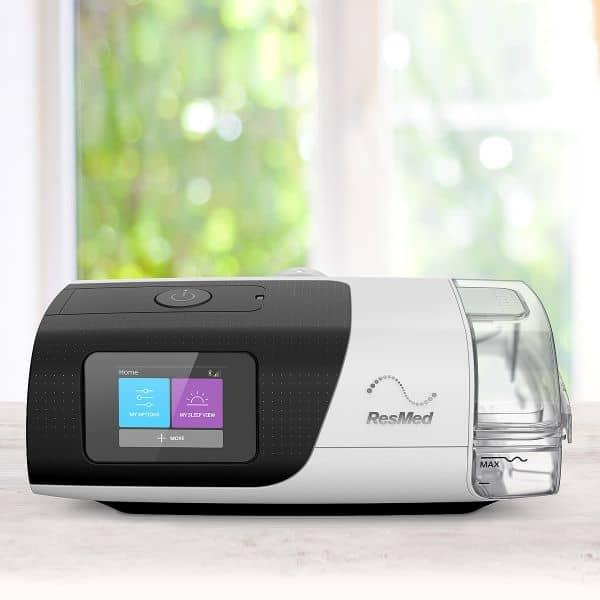Choosing a CPAP machine for home use, what should I look for first?
Obstructive sleep apnea (OSA) is a common disorder that can significantly affect health and quality of life. People suffering from this condition often use CPAP (Continuous Positive Airway Pressure) devices to help them breathe better during sleep. Modern CPAP devices are becoming more and more available for home use, and this allows patients to receive effective treatment in a comfortable environment.
The main criteria for choosing a CPAP device for home use.
- Type of CPAP device.
There are several types of devices, and the choice depends on the specific needs of the patient:
- Standard. Provide a constant level of air pressure that keeps the airways open. This is the basic type of device, suitable for many patients with stable breathing during sleep.
- Automatic. Automatically adjust the pressure in response to changes in the patient's breathing during the night. They can be more convenient and effective for those whose apnea level changes at different times during sleep or depends on body position.
- BiPAP/VPAP devices. Provide different levels of pressure during inhalation and exhalation, which can be useful for patients with more complex breathing problems, such as central sleep apnea or chronic obstructive pulmonary disease (COPD).
- Comfort of use.
Comfort is an important factor when choosing a CPAP machine, as the patient will use it every night. Among the key aspects of comfort, you should pay attention to:
- Mask. Choosing the right mask is critical. The mask should be comfortable, not put pressure on the face, and not cause skin irritation. There are different types of masks: nasal masks, full-face masks, and nasal cannulas. The choice depends on the individual preferences and characteristics of the patient.
- Noise level. Some devices may emit noise during operation. If this can cause discomfort to the patient or their partner, you should pay attention to models with low noise levels.
- Humidification. Some devices have built-in humidifiers that prevent dryness in the nose and throat. This is especially important for patients suffering from dry mucous membranes.
- Functions and technologies.
Modern CPAP devices are equipped with various functions that can make therapy more effective and convenient:
- Automatic pressure adjustment. As already mentioned, automatic devices can independently adjust the air pressure depending on the patient's needs. This can be useful for those whose sleep apnea varies depending on sleep phases or body position.
- Ramp function. Allows you to gradually increase the pressure, starting from a lower level, so that the patient can fall asleep more easily.
- Data monitoring. Some devices can record information about sleep quality, number of breathing obstructions, and other parameters. This data can be useful for the doctor to customize therapy.
- Compatibility with mobile applications. Some models allow you to transfer data to a smartphone or tablet, where the patient can monitor their progress and receive recommendations.
- Portability and compactness.
If the patient travels a lot or plans to use the device outside of the home, portable models should be considered. They are smaller, lighter, and often have additional batteries for use in environments where there is no access to electricity.
- Easy to set up and use.
Ease of use is another important aspect. The patient should be confident that they can easily set up the device and change settings as needed. An intuitive interface, convenient buttons and screen will help simplify the setup process.
- Price and warranty.
The cost of CPAP machines can vary depending on the features and brand. It is important to find a balance between the price and the necessary functions. In addition, you should pay attention to the warranty and service terms. Some manufacturers offer an extended warranty, which can be helpful in case of a machine breakdown.
Recommendations for setting up a CPAP device:
- Consult your doctor. It is important to consult with your doctor or sleep specialist before purchasing and fitting a CPAP machine. They can help you determine the level of pressure you need and help you choose the best model of the machine.
- Correct pressure setting. Even if you are using an automatic machine, it is important to know what pressure range is optimal for you. Your doctor will help you determine these parameters.
- Selection of a mask. It is important to try out several mask options before making a final choice. The mask should be comfortable and fit snugly to the face, preventing air leakage.
- Regular cleaning and maintenance. CPAP devices need regular cleaning, especially the mask and tubing. Bacteria can accumulate on these surfaces, so regular care of the device is important for health.
- Monitoring the effectiveness of therapy. Use the device's capabilities to monitor your sleep. If you notice changes in sleep quality or experience discomfort, contact your doctor to adjust the settings.
Choosing a CPAP machine for home use is an important step that can significantly improve your sleep quality and overall health. When choosing a machine, you should pay attention to its type, features, comfort of use, portability, and ease of adjustment. Be sure to consult with your doctor before purchasing and customizing a machine to ensure the most effective treatment for your sleep apnea.
Modern CPAP machines offer a wide range of features that make therapy more convenient and effective. Choosing the right device will help you enjoy quality sleep and improve your well-being every day, and you can order the device that is perfect for you on our website: https://medsupplycart.com/collections/auto-cpap-machines

